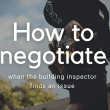I originally wrote this guide for real estate salespeople but realised it could be handy for owners too. It will help you understand what your options are when a property isn’t generating as much enquiry as you might have hoped.
Do you work in property? For more guides like this and other tools to grow your business, visit: agentmonday.com
When your property isn’t moving, it’s time to make changes.
If you are unsatisfied with the amount of enquiry you are getting on your property, use this checklist to come up with ideas to get things moving.
How often should you make adjustments?
In most markets, prices should be adjusted every 2/3 weeks if you haven’t received an offer or generated strong interest.
Adverts can be adjusted as often as you like, but every 2 weeks is probably ideal in most situations. You have to give changes time to work, but you also have to remember that time is of the essence.
It’s also ok to make the same changes twice. Eg. Take the price off, then put it back on again 2 weeks later. New buyers are entering the market all the time and you never know exactly what might grab their attention.
Ideas to generate more enquiry…
I have placed the suggestions below into a downloadable printable checklist (Microsoft Word friendly). Feel free to forward this on to your chosen agent, or just send them this blog post.
- Use stronger wording in the property advert. Motivation works. Buyers want to know that you are serious about selling and are ready to ‘meet the market’. If you are worried this might generate low, bargain-hunting offers, keep in mind that it’s better to have low offers than no offers!
- Change the advert headline. Use your motivation for selling if possible. This will help your property will stand out from the crowd online.
- Make sure you have a strong call to action at the end of your advert. ‘Our owners are determined to sell and are ready to do a deal. Call me today to ensure you don’t miss out on this home…’
- Focus on a different target market. In an ideal world, your advert would focus on one target market and speak to that audience, eg. ‘first home buyers’. If your current focus isn’t working, try targeting investors, or down-sizers, or whoever might suit the home you are trying to sell.
- Change the main photo. Canvas the opinion of other people (particularly those in your target market, if possible). Ask which photo would attract them to the property. The answers may surprise you, especially when you ask people of different ages/backgrounds.
- Go through the photos of the property and remove any that may be putting buyers off. In general, the more photos you have online, the better. But certain photos may make a buyer lose interest before giving your listing a chance. Look for photos that could be taken out of context if you haven’t seen the property in person.
- Add a price indication. If you didn’t have one before, try putting one in.
- Change price from ‘Buyer Enquiry Over’ to a set Asking price. Buyers sometimes find buyer enquiry ranges confusing and think they need to be way above that level to have a chance. Keeping it simple can sometimes make a difference.
- Remove pricing (switch to ‘by negotiation’). Every buyer wants a price but sometimes it pays to remove the asking price, to see if that sparks more enquiry. This works best when you also add motivation to the advert.
- Remove the Rateable Value (or council value) from your advertising. In some markets, salespeople use local rating valuations to garner buyer enquiry, but sometimes it can put people off or send the wrong impression. Removing this may help increase enquiry.
- Text / Email / Phone all past visitors. Tell them the price has been changed or updated. Sometimes just reminding them that it’s still an option might spark another viewing. Maybe they have missed out on a more expensive home since they last viewed your listing? Or maybe their budget has increased. Just because they didn’t show immediate interest last time they visited, doesn’t mean this home won’t work for them.
- Text / Email / Phone visitors of similar properties. This is so often overlooked. Don’t presume every buyer in the market has looked at your listing online. Ask your salesperson to go through open home registers of similar properties to call those visitors and invite them to view your property too.
- Try a Facebook boosted post. These are great value and you can target certain demographics that might be looking for a home like yours. You can also try posting the property on Facebook marketplace. This isn’t often used for selling houses but agents I have spoken to say this strategy definitely makes the phone ring!
- Upgrade the online presence. Most property domains have upgrades you can buy. If your property is well-priced, it’s important to make sure the market knows it’s for sale! Invest in the best promotion you can afford. There are always more buyers joining the market too, so don’t be afraid to try a ‘super feature’ type upgrade 2 or 3 times during your campaign. This works really well when you combine it with a price adjustment or new main photo/headline combo.
- Run a Google Display Network campaign. There are companies in all markets that offer a set package for this now. They are often good value, with campaigns usually starting around $100+ and it’s worth a shot if your property has great photos and represents good value. Ask your salesperson what options they have available.
- Add a rental appraisal figure to the advert and start targeting investors.
Download Printable Checklist (Microsoft Word friendly)









